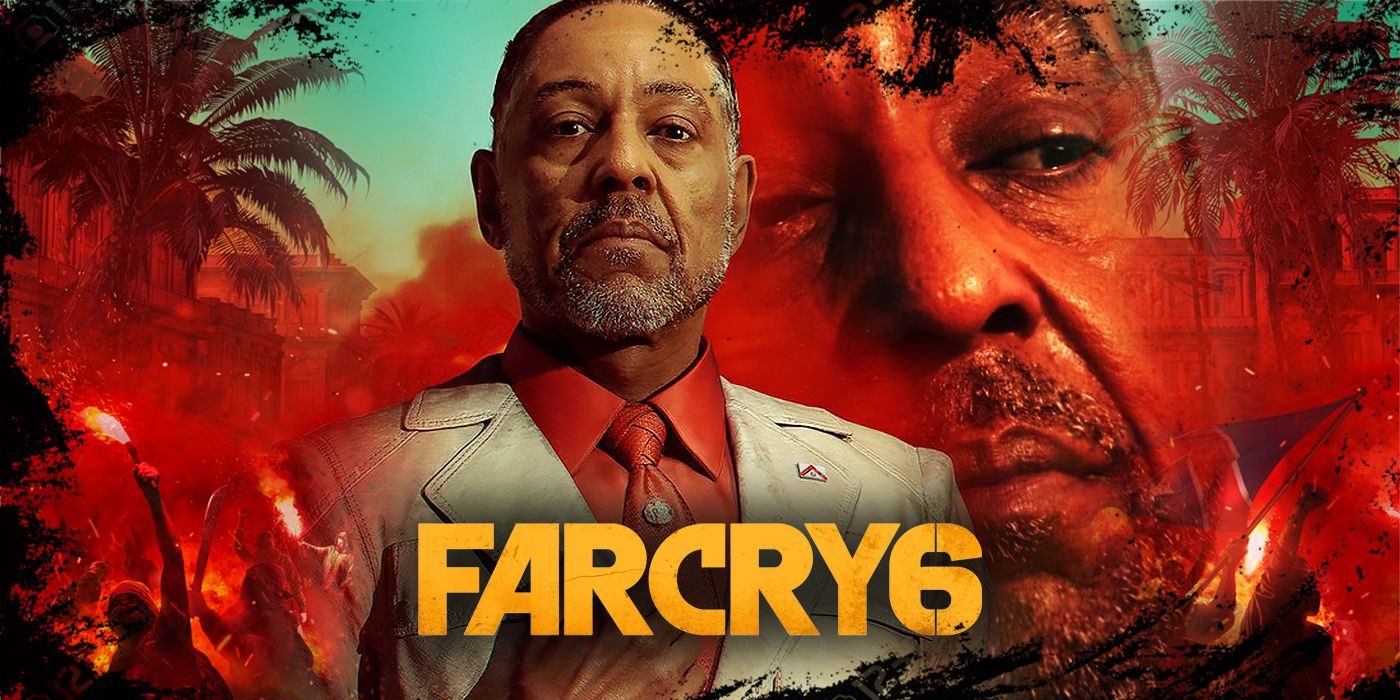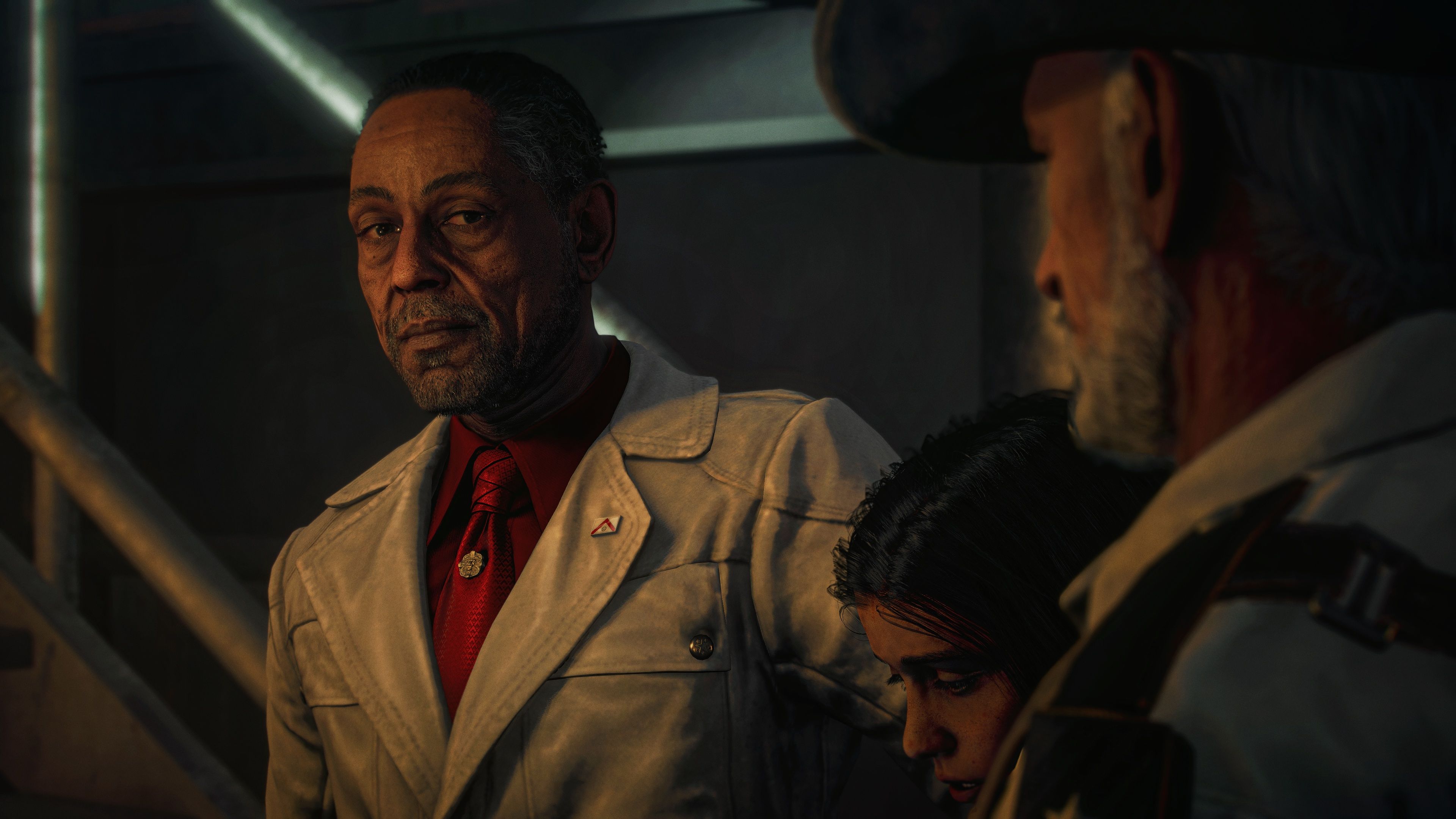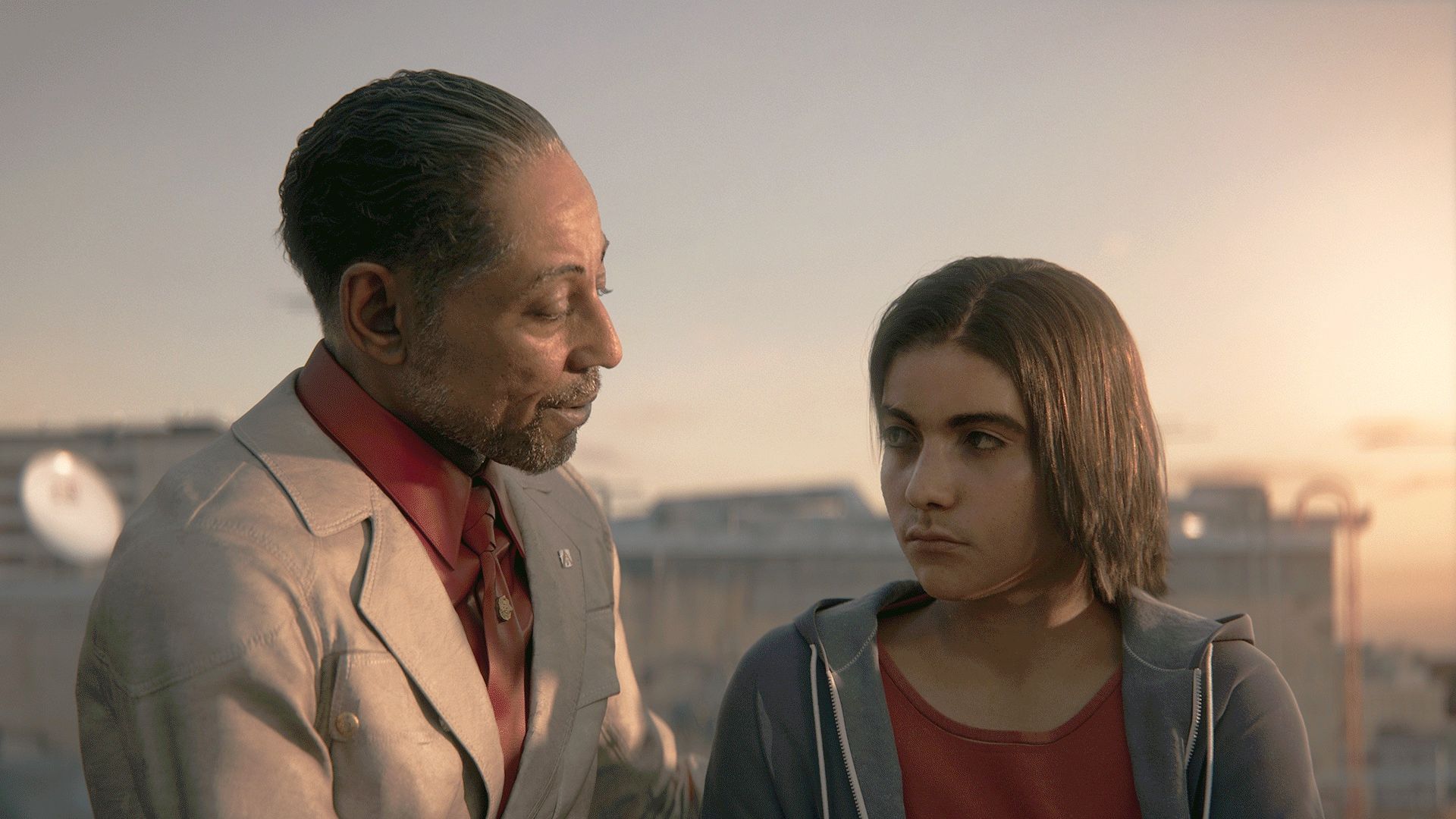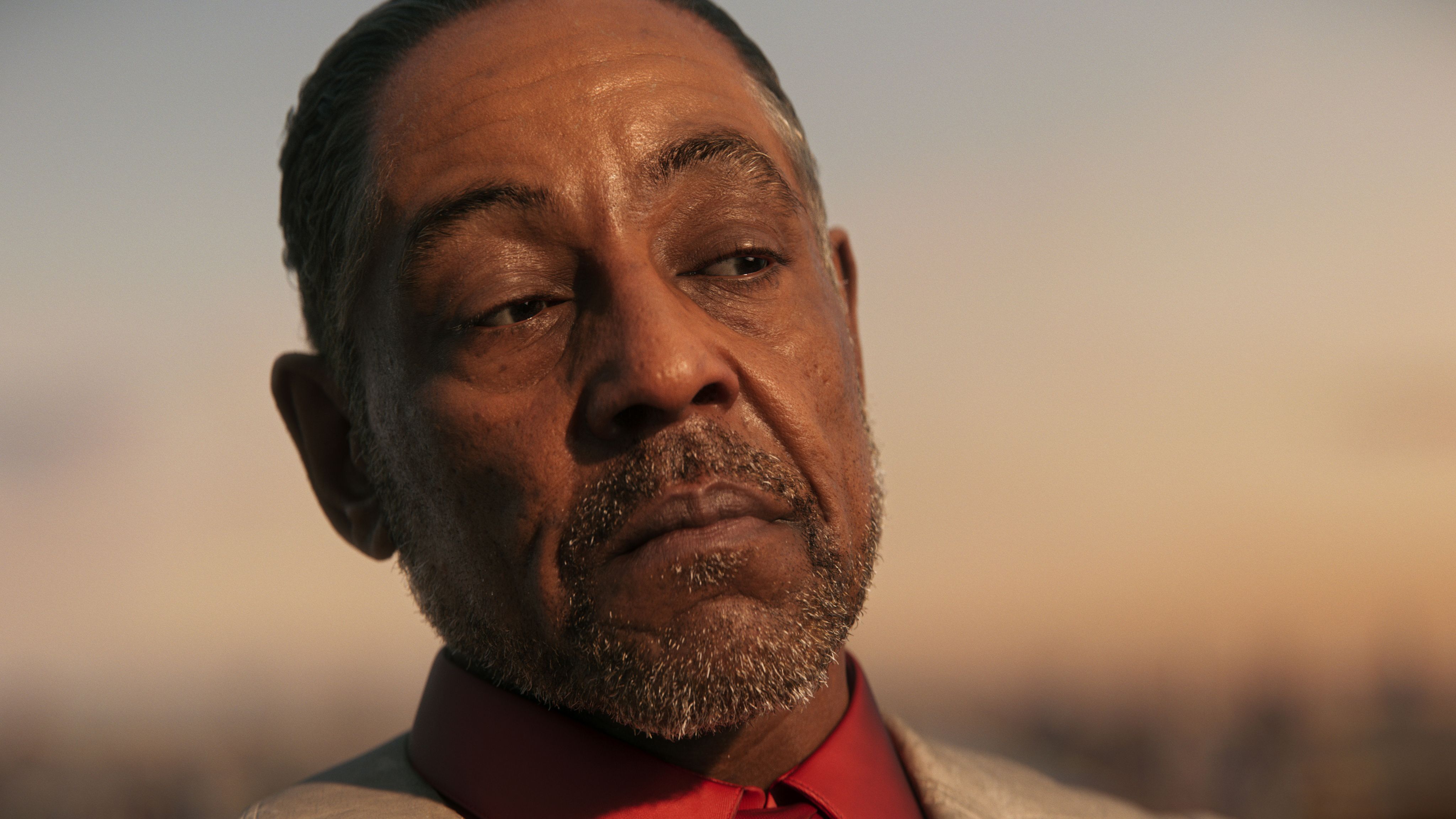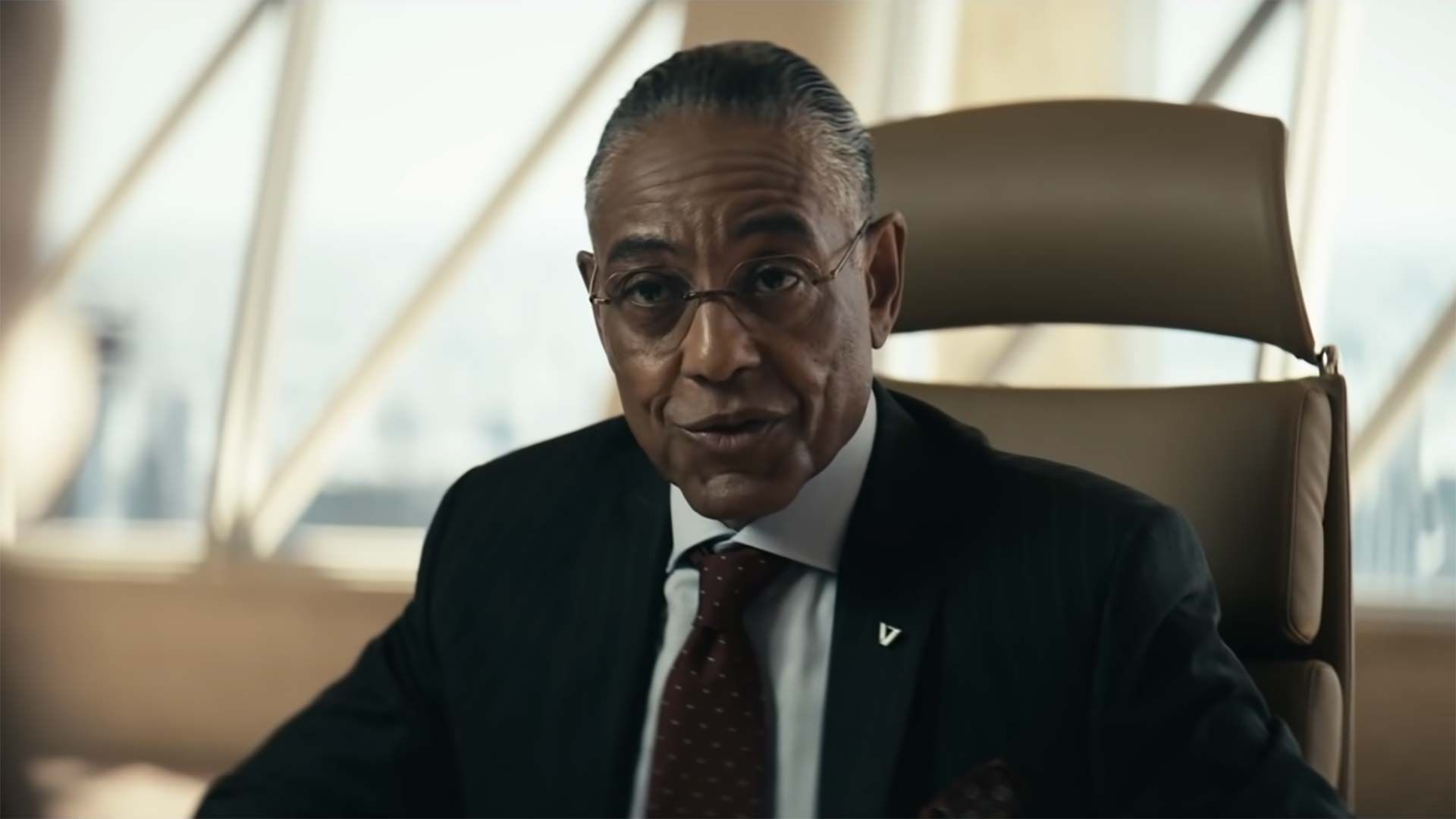Giancarlo Esposito has had a wild career going back decades. But it was the role of Gus Fring, he says, which changed his life, as he quickly became a go-to performer for darker characters, due to his gift for bringing nuance to these malevolent roles. And it's obvious where that nuance comes from when you talk to him about his work, as his thoughts on the process of acting and how he approaches each role individually are both lyrical and so honest.
Esposito is currently a key figure in shows including The Mandalorian, The Boys, and Better Call Saul, but his next big project to debut takes place in a totally different realm. As Anton in Far Cry 6, the latest installment in Ubisoft's series of first person shooter games, Esposito draws upon his experience to embody the role of a charismatic dictator running a Cuba-esque island nation, one with a rich backstory.
"It's probably been a six-year process to have to make this game from beginning to end," he told Collider in a one-on-one interview leading up to the game's release. "and so it's taken a lot of really meticulous and wonderful work from many different artisans. Some of whom I met when I was shooting it, because I was very interested in the technological part of this and how they actually do it, who's responsible for what. It just fascinated me that the time and care would be put into this as it has been. And now seeing pieces of the final product, I realize why. It's a magnificent and fascinating journey to me."
Below, Esposito explains what that journey was like for him as an actor, what it means to him to embody a character's charisma, and what goes into approaching a scene that feels like it might not require much in the way of acting. Plus, he doesn't exactly say which of his many roles feels the most classically evil to him, but his thought process in response to that question is wonderful to behold.
Collider: Diving into Far Cry, I read somewhere that you brought props to your first meeting with the director?
GIANCARLO ESPOSITO: Oh, that's too funny. I sure did. I was very nervous when they wanted to meet with me. I always think a meeting they say is a meeting, but it really is an audition. And so I wanted to be thinking about the character and who this character would be. And I'm so happy. They had ideas as well, but I walked in with ideas and I knew part of it was to be a character who was so well-defined and in control of any situation at the time. I only had read through the log lines that this character had to have vulnerability as well, and had to have historic reasons behind his journey.
So yeah, I bought some props with me because I felt like he needed to have them. I think I brought a cigar. I think I brought a certain pocket watch with me, things that would ground me and allow me to have some gravitas if I needed it. And I was compelled to wear a three-piece suit. You know, for some reason I felt like it gave me some real power, that he looked really refined and royal and regal because after all he is El Presidente and all of that really worked for me.
They showed me the final pictures of what they wanted Anton to look like, and he was wearing white with a red sash. He looked like a bandleader. I was like, really? You wanted the dude to look like that? And they're like, "yeah, it's Yara. It's this little island." And the more I looked at things and researched things like the knife he carried... I remember meeting the artisan who just worked on the scabbard, just the thing you put the knife into, he was working on that for a year, six months... A year. Right? So I thought, wow, it all fit beautifully, because it was a throwback to a Caribbean kind of feeling that was really necessary for the piece. And I was so thankful to be allowed into the collaboration of every part of it.
Navid [Khavari] was brilliant in our conversations because I'm doing all this homework and I'm writing him, could it be this, could it be this? What about this? What about this? Not based on anything particularly historic, other than the history that we'd given the character, which was really phenomenal, which is drawn from our world. And so I love that about this piece.
In describing this character, the word charismatic keeps getting used. When someone says, "Hey, play this character charismatically," is that something you have to calibrate?
ESPOSITO: Well, I realized that we have an idea of what good and evil is. We have an idea of who is good and evil. And that idea gets skewed as our history moves forward and we witness more and more atrocities around the world of people who claim to be democratic and are not because they really want to line their pockets. That's a lot of people that we know, some of whom have governed our country, and then they go and they cultivate. And it's not our advertising about the I and the me and less about the we and the us.
So I wanted Anton to have charisma surrounding his vision for a better country, for him pushing against countries who are wealthier, who say, we'll give you arms. We'll arm you. You'll be able to defend yourself against that other island over there that's trying to get your resources, but we want something in return. I wanted Anton to be someone who said no to that. We have to cultivate our own resources. We have to cut or cultivate our own weapon, own protection. And with that understanding, then he has to get people to work for him, to get those resources out of the ground or off the trees are developed in certain ways.
Then he has to be the one who has basically some indentured service to some slavery. And so through his journey, having been Anton's previous history is something that really was something we talked about a lot. Someone who looked up to his father, his father was overthrown. He was deposed, and then groomed in incarceration. Learning how to empower myself has helped me to learn how to empower other people. And people respond to that.
I was on the set directing a few weeks ago and I have an actor who's deserving of everything in my scene, been around a long time, really good at what he does. But sometimes you get a little over it on certain days, simple as that. You're a little over it. Director's telling you the same thing, and you've been doing the role a long time. You got it down. And I went, how do I empower this actor?
It reminded me, don't know everything. I said this to myself two days ago on the set. I don't know everything. Why don't you come from that standpoint? So I went, how do I do it? And what I came up with was, wow, the respect I had for this actor. "You are really great at what you do. That take you just did was phenomenal. Right? But I felt like this and this and this and this and this and this and that, you could go further and then allow yourself to soar and blah, blah, blah, blah, blah, blah, blah, blah."
But I let the first comment sit for another take. "It's fantastic. Do you know how powerful you are? Do you know? Right?" It was true. I wasn't just bullshitting. And that person, all of a sudden was grounded in the scene and it worked in a deeper way. And when it happened, that actor could hear me on the other side of two walls going, "Yes!" Because all of a sudden there was a freedom there. But I realized from looking at the person that that person needed confidence. He needed to be loved. He needed to be told that what he's doing is on the right track. He needs to know also in a graceful way, don't be lazy. Right? It's how you speak to people, how you empower them to be all that they can be, whatever that is. Even in their failure, fail. Fail miserably. Go big. It's the only way to do it.
No, of course. It reminds me of the story I've heard about veteran actors where they'll read a script and they'll write, I think, NAR on some scenes — which stands for no acting required.
ESPOSITO: Oh, I never heard that. I know an actor, Tom Bauer, who I directed in my second feature film who would write the whole script. He wrote every line he said. Because I also believe that through your hand comes a connection to your spirit and your brain. He'd write all of his lines out, at least once the whole script. Right? And so I feel like no acting required is an overall note for either be lazy, I don't have to do anything or don't forget to do everything and then not act. That's how I want to see it.
Yeah. I think, when I've heard it, it's a comment on a scene where you've seen it a bunch of times before, so you just go in and say the lines.
ESPOSITO: I know. And part of that could be true, but what about the investigation? I know that to me is just lazy. I'm doing a role in New York right now where every night I go and have dinner in some rusty bucket place where there's one table and I'm sitting there with a script and a pen and I'm writing all over my script because... And I had this thought last night — I'm doing a new project in New York and I went, oh, I know what the scene is. This is this from this. Right? It's a scene we've seen before. I'm feeling, oh, I get it now. Okay. Then I go, okay, that's exciting to me, but how is it not that. Right? It has all the elements of the edginess that we've seen before in heat or in...
God I keep thinking all day now of Robert Mitchum in Cape FearCape Fear and I went, oh yeah, it's that. It could be that. It has that element, but how is it different? So yeah, there's no two things that are the same unless you make them the same.
Right. That's wonderful. To wrap up, you've gotten to play so many characters which fall onto some spectrum of villainy. If you were to pick out one as the most classically evil character you've ever played, which one would it be? Because it sounds like you wouldn't necessarily pick your Far Cry 6 character.
ESPOSITO: No, I wouldn't necessarily pick that, but I don't know if I have any character that's classically evil. And I think that's what's changed the game for me because Gus Fring, I would immediately go to him. Because I can dive into that and I scare people in real life, but that's a part of me: When we are able to take someone in completely — give space, drop yourself down so you're listening, but seeing everything about them — it makes people uncomfortable. It truly makes them uncomfortable. Because you're not multitasking, looking at your phone or another five things, you're looking into their soul. I don't think that's a bad thing. I think it's an attentive thing. I believe that Gus was a character and is a character who really had an agenda. And his agenda wasn't necessarily evil. It was straight and to the point.
So I think part of my career that's been so wonderful, and it started with really with Gus, is that no one is just evil. It's neither black nor white. It's a shade of gray. And it could be either/or, which is why I loved playing him and love playing Anton with color. Right? You become an amalgamation of all the good and the bad that makes you evil by the decisions you make while the camera's on. So for me to say, this is an evil guy I'm going to play him evil, is skipping all the steps that it would take for me to see him become reprehensible. And I want it. I want you to see me become that. I want you to see me absolutely lose it. Absolutely forget who I am. Like when I wake up on some days I go, who the hell am I? Giancarlo, sit on that cushion behind you and meditate because you're playing so many different people. Taking on the energy of that, you need to clear that and come back into your own and know who you are.
So I think it's a journey. I don't want to avoid your question at all, but I think that's been the success of what I do. Stan Edgar on The Boys. He is working for a German company that created this drug that would allow you to be super-duper, Compound V, but is he evil? Yeah, I think he's evil. Is the corporate evil the most evil? Yeah, I think so. I mean, Gus had revenge. He also helped people. He was hiding in plain sight. Fascinating. So you become that evil and I want you to see me become that nefarious evil person who's lost his way in the desert that we are in. I want you to have the experience of that. So that's my answer.
Oh, God. I love your questions. Because it makes me think on a different level of who I really am and where I lie in the spectrum of things I have to say, thank you and I love what I do. It's allowed me, my brain and my consciousness to think differently, through talking to so many people today about this particular wonderful Far Cry 6 game.
Yeah. I mean, I could listen to you talk about it all day long. It's such a pleasure. Have you wrapped with Better Call Saul?
ESPOSITO: Can I say it? Yeah. We're still in the sixth season. I have wrapped most of my acting work. I have a few loose ends to take care of.
Saul Goodman, watch out. In the meantime, Far Cry 6 debuts October 7 on PC, Stadia, PS4/PS5, Xbox One, and Xbox Series X/S.

